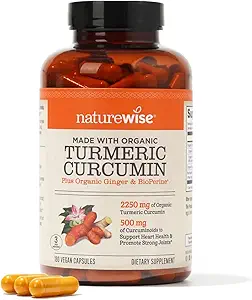Turmeric, the vibrant yellow spice that gives curry its distinctive color, has been used for centuries in traditional medicine. But recent scientific research is uncovering a wealth of potential health benefits that go far beyond its culinary uses. From fighting inflammation to boosting brain function, this golden powder is proving to be a powerhouse of wellness.
Key takeaways:
• Curcumin, the main active compound in turmeric, has potent anti-inflammatory and antioxidant effects
• Turmeric may help prevent and treat chronic diseases like heart disease, cancer, and Alzheimer's
• Combining turmeric with black pepper can enhance its absorption by up to 2000%
• More research is needed to fully understand turmeric's effects and optimal dosage in humans
The science behind turmeric's health benefits
At the heart of turmeric's health-promoting properties is curcumin, a bioactive compound with powerful anti-inflammatory and antioxidant effects. Numerous studies have shown that curcumin can influence multiple signaling molecules and cellular pathways involved in inflammation, oxidative stress, and cell survival[1].
One of the most well-researched benefits of turmeric is its potential to fight chronic inflammation, which is believed to play a role in many diseases including heart disease, cancer, and neurodegenerative conditions. A 2017 review of studies found that curcumin supplementation significantly reduced markers of inflammation in patients with metabolic syndrome[2].

Turmeric for heart health
Cardiovascular disease remains the leading cause of death worldwide, but turmeric may offer some protection. Studies have shown that curcumin can improve several risk factors for heart disease, including:
• Reducing LDL ("bad") cholesterol and increasing HDL ("good") cholesterol
• Improving endothelial function, which is crucial for regulating blood pressure
• Reducing inflammation and oxidative stress in the cardiovascular system
A 2012 study found that taking curcumin supplements for 8 weeks was as effective as exercise in improving endothelial function in postmenopausal women[3].
Boosting brain function and fighting neurodegeneration
Exciting research is emerging on turmeric's potential to enhance cognitive function and protect against age-related brain diseases. Curcumin has been shown to:
• Increase levels of brain-derived neurotrophic factor (BDNF), a growth hormone that promotes the formation of new neurons
• Improve memory and attention in older adults with mild cognitive impairment
• Potentially slow or even reverse the progression of Alzheimer's disease by clearing amyloid plaques
A small 2018 study found that taking 90mg of curcumin twice daily for 18 months led to significant improvements in memory and attention in non-demented adults[4].
Cancer-fighting potential
While more research is needed, early studies suggest that curcumin may have anti-cancer properties. It has been shown to:
• Inhibit the growth and spread of cancer cells in laboratory and animal studies
• Enhance the effects of certain chemotherapy drugs
• Potentially reduce side effects of cancer treatments
A 2019 review concluded that curcumin shows promise as an adjunct therapy for various cancers, though more human trials are needed to confirm its efficacy and safety[5].
Enhancing turmeric's benefits
One challenge with turmeric is its low bioavailability - the body doesn't absorb it very well on its own. However, there are ways to enhance its absorption:
• Combining turmeric with black pepper, which contains piperine, can increase curcumin absorption by up to 2000%
• Taking turmeric with a source of fat can also improve absorption, as curcumin is fat-soluble
• Using a high-quality turmeric supplement with enhanced bioavailability
It's important to note that while turmeric is generally considered safe, high doses or long-term use may cause side effects in some people. Always consult with a healthcare professional before starting any new supplement regimen.
Conclusion:
The research on turmeric's health benefits is promising, but it's still in its early stages. While turmeric shows potential for preventing and treating various chronic diseases, more large-scale human studies are needed to fully understand its effects and determine optimal dosages. In the meantime, incorporating this golden spice into your diet or considering a high-quality supplement may be a safe way to potentially boost your health and longevity.
Want to stay up-to-date on the latest longevity research? Sign up for our newsletter to receive weekly updates on breakthrough studies and practical tips for living a longer, healthier life.
References:
[1] Hewlings SJ, Kalman DS. Curcumin: A Review of Its Effects on Human Health. Foods. 2017;6(10):92.
[2] Panahi Y, Hosseini MS, Khalili N, et al. Effects of curcumin on serum cytokine concentrations in subjects with metabolic syndrome: A post-hoc analysis of a randomized controlled trial. Biomed Pharmacother. 2016;82:578-582.
[3] Akazawa N, Choi Y, Miyaki A, et al. Curcumin ingestion and exercise training improve vascular endothelial function in postmenopausal women. Nutr Res. 2012;32(10):795-799.
[4] Small GW, Siddarth P, Li Z, et al. Memory and Brain Amyloid and Tau Effects of a Bioavailable Form of Curcumin in Non-Demented Adults: A Double-Blind, Placebo-Controlled 18-Month Trial. Am J Geriatr Psychiatry. 2018;26(3):266-277.
[5] Giordano A, Tommonaro G. Curcumin and Cancer. Nutrients. 2019;11(10):2376.
Citations:
[1] https://www.ncbi.nlm.nih.gov/pmc/articles/PMC5664031/
[2] https://www.health.harvard.edu/staying-healthy/turmeric-benefits-a-look-at-the-evidence
[3] https://www.ncbi.nlm.nih.gov/pmc/articles/PMC7522354/
[4] https://namefatso.com/blog/turmeric-slogan-ideas
[5] https://www.healthline.com/nutrition/top-10-evidence-based-health-benefits-of-turmeric
[6] https://worldwidescience.org/topicpages/t/turmeric%2Bclones%2Bcurcuma.html
[7] https://ijdvl.com/turmeric-a-condiment-cosmetic-and-cure/













Member discussion